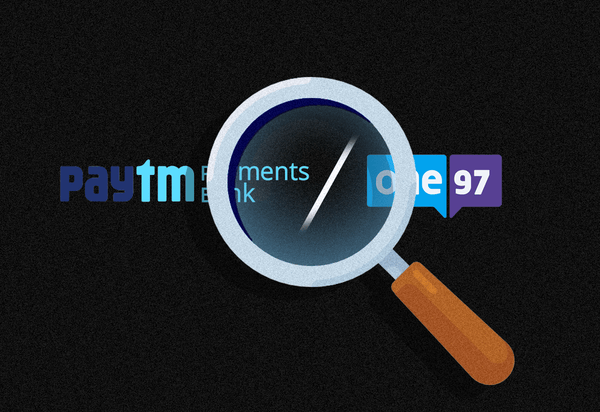Add your promotional text...
Paytm Parent One97 Communications Surges 8% Amid Strategic Moves and Favorable GST News
Synopsis: Shares of One97 Communications, the parent company of Paytm, rose by 8% to ₹678.50, driven by investor optimism over the GST Council's decision not to impose GST on UPI transactions under ₹2,000. Additionally, Paytm's sale of its entertainment ticketing business to Zomato for ₹2,048 crore is seen as a strategic move to refocus on core financial services. This follows a recovery from earlier setbacks, including a ban by the RBI on new deposits for Paytm Payments Bank.
TRENDING STOCKS
By Aman Jaiswal
9/10/20243 min read


In a notable move, shares of One97 Communications, the parent company of fintech giant Paytm, surged by as much as 8%, reaching ₹678.50 per share during the early trading session on September 10th. This sharp uptick in the stock’s price has left market watchers curious about the exact cause behind the rally. While no clear reason has emerged, the likely catalyst seems to be recent policy updates, specifically, GST Council’s decision not to impose GST on UPI transactions below ₹2,000. This favorable news may have played a role in boosting investor confidence in the stock.
Paytm Share Price Movement
The fintech sector has been closely monitored by investors, and Paytm’s stock is no exception. The 8% rise in its share price is a positive development for the company, especially considering the rollercoaster ride it has experienced over the past few years. The announcement regarding no GST on UPI transactions under ₹2,000 likely provided relief to the company, which relies heavily on digital payments for revenue generation.
Strategic Shift: Zomato Acquires Paytm’s Entertainment Ticketing Business
One of the other contributing factors to the positive sentiment around One97 Communications could be the strategic divestment of its entertainment ticketing business. In a move aimed at narrowing its focus, Paytm recently sold its entertainment ticketing business to Zomato for ₹2,048 crore. This transaction will allow Paytm to zero in on its core offerings of payments and financial services distribution, aligning with its long-term goals.
The entertainment ticketing business, covering movies, sports, and live events, will be transferred to two subsidiaries Orbgen Technologies Pvt Ltd (OTPL) and Wasteland Entertainment Pvt Ltd (WEPL) before being sold entirely to Zomato. This move is a strategic win for both companies, as Zomato strengthens its “going-out” segment, while Paytm sharpens its focus on its core strengths.
The Structure of the Deal
The boards of both Zomato and One97 Communications Ltd have given their nod to this all-cash deal, marking another milestone in Paytm’s ongoing business restructuring. After the transfer of Paytm’s ticketing platforms, TicketNew and Insider, Zomato plans to spin off the newly acquired businesses into a separate app called District. This move will allow Zomato to consolidate its entertainment offerings under one platform, further boosting its position in the consumer services market.
Paytm’s Recovery After RBI Ban on PPBL
It’s important to note that this isn’t the first time Paytm has been in the spotlight this year. Earlier in 2024, the company’s stock took a significant hit following an RBI ruling in February. The Reserve Bank of India barred Paytm Payments Bank Ltd (PPBL), an associate of One97 Communications, from accepting new customer deposits starting March 15. This action was taken after a thorough audit report raised concerns about the company’s operations.
The RBI's decision had a profound impact on Paytm’s stock, causing it to plummet to a 52-week low of ₹310 in May 2024. However, since hitting this low point, the stock has more than doubled, reflecting growing confidence in the company’s ability to overcome regulatory challenges and refocus on its core business.
Compliance and System Audit Concerns
The ban on Paytm Payments Bank came after the central bank reviewed a comprehensive system audit report and a subsequent compliance validation report submitted by external auditors. These audits revealed certain operational and compliance deficiencies that Paytm was required to address. While the ban on new deposits was a significant blow, Paytm has been working closely with regulators to ensure compliance and regain trust in the market.
What Lies Ahead for Paytm?
As Paytm continues its journey of recovery and refocusing, there are multiple factors that could influence its future stock performance. The divestment of its entertainment ticketing business is a strategic move that will likely help Paytm sharpen its focus on payments and financial services. Additionally, the favorable decision by the GST Council not to impose taxes on UPI transactions under ₹2,000 will provide further support to the company’s revenue streams.
Despite the challenges Paytm faced earlier this year, including regulatory setbacks and significant stock price fluctuations, the company’s recent moves signal a potential turnaround. Investors will be watching closely to see how these developments translate into financial performance in the coming quarters.
In conclusion, the 8% rise in Paytm’s share price is likely the result of a combination of factors, including the absence of new GST charges on smaller UPI transactions and strategic business decisions, such as the sale of its entertainment ticketing arm to Zomato. As the company refines its focus on core offerings, investors are showing renewed interest, pushing the stock higher after a period of volatility. While challenges remain, Paytm’s steps toward streamlining its operations and complying with regulatory requirements suggest that it is on a path to recovery and growth.
